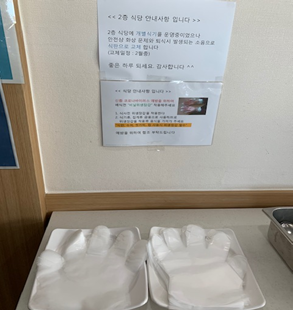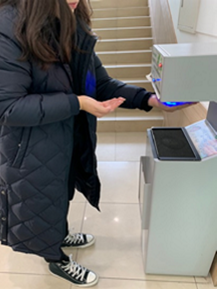policy



(Campus-wide preventive measures against the new coronavirus are being enforced.)
In response to the coronavirus outbreak, KAIST has decided to alter the academic calendar, postponing the opening of the spring semester until March 16, two weeks behind the original schedule. This is following the decision of the Deans’ Council to postpone or cancel the major academic ceremonies and events scheduled in February.
According to the decision, the commencement ceremony scheduled on February 21 will be postponed; meanwhile the freshmen orientation and matriculation ceremonies have been cancelled. Additionally, the ceremonies for the KAIST anniversary and faculty retirement ceremony scheduled on February 14 and the faculty workshop on February 27 have been postponed. There have been no confirmed coronavirus cases among the KAIST community as of February 6.
The university is also enhancing campus-wide precautionary safety measures to prevent the spread of the disease. The Facilities Management Office said that they will start disinfecting all dining facilities, cafeterias, libraries, lecture halls, and student halls for two days from Feb. 6. Plastic gloves are provided at cafeteria, which is using buffet spoons and tongs, and cafeteria patrons are being asked to wear the plastic gloves when they place food on their own plate in a preventive measure to avoid possible contact between individuals.
KAIST also launched a 24/7-hour Emergency Response Team and disseminated a response manual to KAIST community members. The Office of Student Life surveyed students, faculty, and staff to report if anyone has traveled to China or been in contact with visitors who made a trip to China within the last two weeks.
The university designated a building in one of the dorm complexes as a quarantine facility and a total of 11 people who visited China have been self-quarantined for two weeks from January 31.
Provost and Executive Vice President Kwang Hyung Lee explained in his letter to KAIST community members on February 4 that the university is exerting all possible measures and efforts against the spreading virus and asked for every member’s cooperation to prevent the further spread of the disease.
“Those who self-quarantined don’t have any symptoms. This is just a precautionary measure. The self-quarantine at our facility is only limited to those who declared that they do not have a legal residence in Korea,” said Provost Lee. The transportation to the facility is specially arranged and meal boxes are delivered to the quarantined room individually. A full-time guard in front of the isolated dorm building will be on duty 24 hours a day.
He explained the university chose the Hwaam Complex as the self-quarantine facility because each building in the complex is set apart from the others and each room has its own bathroom and shower facilities. Provost Lee said that the university will use another dorm complex if any current dorm residents where the quarantine facility has been set up wish to move to other dorm complexes.
(END)
-
research KAIST leads AI-based analysis on drug-drug interactions involving Paxlovid
KAIST (President Kwang Hyung Lee) announced on the 16th that an advanced AI-based drug interaction prediction technology developed by the Distinguished Professor Sang Yup Lee's research team in the Department of Biochemical Engineering that analyzed the interaction between the PaxlovidTM ingredients that are used as COVID-19 treatment and other prescription drugs was published as a thesis. This paper was published in the online edition of 「Proceedings of the National Academy of Sciences of Ameri
2023-03-16 -
research A Mathematical Model Shows High Viral Transmissions Reduce the Progression Rates for Severe Covid-19
The model suggests a clue as to when a pandemic will turn into an endemic A mathematical model demonstrated that high transmission rates among highly vaccinated populations of COVID-19 ultimately reduce the numbers of severe cases. This model suggests a clue as to when this pandemic will turn into an endemic. With the future of the pandemic remaining uncertain, a research team of mathematicians and medical scientists analyzed a mathematical model that may predict how the changing transmissio
2022-02-22 -
research Research Finds Digital Music Streaming Consumption Dropped as a Result of Covid-19 and Lockdowns
Decline in human mobility has stunning consequences for content streaming The Covid-19 pandemic and lockdowns significantly reduced the consumption of audio music streaming in many countries as people turned to video platforms. On average, audio music consumption decreased by 12.5% after the World Health Organization’s (WHO) pandemic declaration in March 2020. Music streaming services were an unlikely area hit hard by the Covid-19 pandemic. New research in Marketing Science found that
2022-02-15 -
fund Seegene Opens Covid-19 Testing Mobile Station on Campus
Seegene donates testing reagents for 40,000 people with results available in three hours Seegene, a molecular diagnostic testing company, donated enough testing reagents for 40,000 COVID-19 tests for the KAIST community and set up a mobile testing station run by the Seegene Medical Foundation on October 28. The entire COVID-19 diagnosis process, including specimen collection, PCR testing, and results analysis, can be conducted at the mobile testing unit developed by Seegene. The on-site tes
2021-11-03 -
event MCM Utilized at Residential Treatment Center in Gyeonggi
The Mobile Clinic Module (MCM) developed by the KAIST Action for Respiratory Epidemics was installed at special residential treatment center in Gyeonggi Province on September 13. The MCM is an isolate negative pressure unit fitted with high-quality medical equipment, developed by Professor Taek-Jin Nam of the Department of Industrial Design under the KAIST New Deal R&D Initiative. This is also a part of the Korean Disease Control Package Development Project from last July. In January, a
2021-09-15